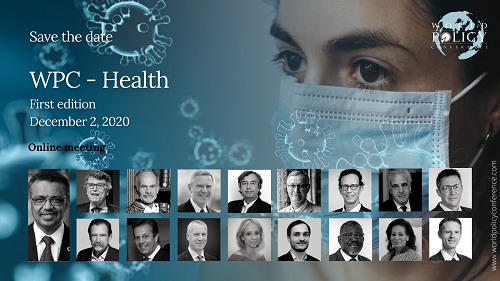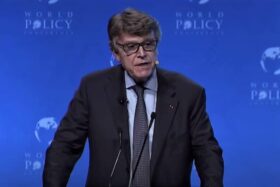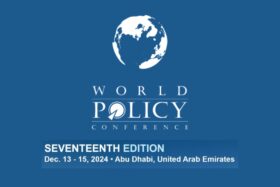
International Relations
Speeches
Conférence le 2 décembre 2020

Created in 2008, and building on the success of twelve yearly editions, the World Policy Conference (WPC) has become a not-to-be-missed event on the global agenda. The annual meeting of the WPC brings together major figures from all five continents – politicians and business leaders, academics and media people – in a spirit of tolerance that is key to promoting the common good.
As Sino-American competition takes an aggressive turn and the rise of populist or nationalist forces, with disturbing ideological rivalries in the background, can be witnessed just about everywhere, the WPC’s approach seems more relevant and necessary than ever. The excesses of liberal globalization are largely to blame for those trends. The WPC seeks to contribute to the improvement of global governance with an eye to ensuring the viability of a reasonably open world. That means striking the right balance between the dominant late 20th-century ideology of a “flat world” open to all the winds of capitalism; and the temptation, despite the Internet and social media, to return to an inter-State system ruled by the idea of the balance of power, where the collective approach to security would be reduced to the bare minimum, including in the economic order in the broad sense. A good approach to global governance must start with understanding the existence of States as the fundamental reality of the international system as a whole, despite the Internet. This system must aim for a method of organizing collective security that is effective in dealing with the wide-ranging challenges brought about by interdependence. It must be such that no State has an interest in breaking free from it without incurring great risk to itself. The quest for such a method of organization is a real challenge but it must be met: as 2020 draws to a close, the odds of the international system breaking down and drifting towards a form of World War III, although still low, are rising.
The main fact of globalization in 2020 is obviously the Covid-19 pandemic, which has spared no country. It took all the planet’s leaders by surprise, not because public health experts had not issued warnings about the possibility, but because, since nobody in living memory had ever experienced such a cataclysm (except to some extent in certain Asian countries), no government was seriously prepared for it. Consequently, a shock is resounding around the whole world, continuing to accelerate and dramatize pre-existing trends, including helter-skelter deglobalization. And yet, because of its low mortality, Covid-19 is not the worst pandemic that could have happened.
It is time, then, to introduce health as one of the WPC’s major themes, on an equal footing with more traditional ones such as geopolitics or geo-economics, which sometimes overlap with it. We obviously do not claim to create a new professional international conference on health. There are many of them. Our purpose is to raise awareness of the key political, social, technological, economic and ethical dimensions of this subject, for an audience whose major concerns are the policy aspects of interdependence among nation-states.
To that end, we want to hold an annual one-day forum, called WPC – Health, that brings together a few dozen figures, mostly from academia, public organizations, business, politics and civil society, before the plenary WPC (the 13th of which will take place in Abu Dhabi from February 26 to 28, 2021). The participants will be expected to have a significant background and interest in promoting health-related policy issues for the benefit of non-expert but influential circles. It is our intention to follow up on this one-day meeting. A printed report will be widely disseminated, and a digital version will be available on the WPC website. Last but not least, a plenary session and/or a workshop of each plenary edition of the WPC will be dedicated to the main issues discussed during the previous WPC – Health meeting.
After careful consideration, due to Covid-19, we have decided this year to focus our efforts on substance, and therefore to hold the first WPC – Health meeting as a video-conference, mainly although not exclusively between the speakers on the originally scheduled program. The idea is to have a truly interactive format. However, the day’s proceedings will be fully recorded and available immediately afterwards on the WPC website, where the above-mentioned report will be posted.
Now here are some words on the four parts of the first meeting that are currently planned. All the talks will revolve around the idea of global governance. Therein lies not just the originality but also the legitimacy of our project. During the opening session, I will introduce the project in its entirety, placing it more specifically in the present international context. And then we will ask to the Director-General of the WHO to develop his vision based on his strategic position, awaited all the more eagerly since the United States has called his management of the crisis into question. He will also set the tone of our work.
The following session will be called The Lessons of Covid-19. The key question, we think, is whether the WHO’s present statutes allow it to adequately meet the global health governance challenge. This is a thorny issue, comparable to arms control in that it entitles the international community to look into the domestic affairs of States. The many lessons of Covid-19 will be examined from four complementary points of view: that of recognized public health experts at the global level; one specialist at the regional level (Africa); industry at large (pharmaceuticals, insurance, etc.); and the UN as a whole. In passing, it should be noted that as a matter of principle the WPC associates all global governance stakeholders, i.e. obviously public players (States, international organizations, etc.) but also economic ones, without whose participation effective governance is inconceivable, in its approach to global governance. It will be necessary to gradually bring in other stakeholders, such as NGOs and the media, as well.
The running thread of the second session, Technology, Economics, Health Ethics, starts with technology, whose breathtakingly swift developments are critical in all governance issues. The issues of information in the broadest sense (including fake news) and access to, control and processing of big data are at the heart of technology. This raises major economic and ethical concerns. The more traditional aspects of the conditions of access to technology, such as machinery in the broad sense, is also a key factor in access to healthcare, especially in developing countries. Neither technology nor the economy should be reduced to the digital dimension. For example, the Covid-19 pandemic has raised awareness of the extreme delocalization, during decades of liberal globalization, of the manufacturing of even the most common medicines. Today this raises serious geopolitical and even geostrategic issues that must be thoroughly analyzed. The introduction of ethics in this session is necessary because no global health strategy is conceivable if it is not socially acceptable. Tracing is an obvious example. But this already huge challenge is complicated by cultural differences from one country to another. If we stick to the Covid-19 pandemic, ethical questions have arisen around more or less implicit trade-offs between the economy in the medium term and health in the short term, between the lives of the young and the old, etc. All the issues discussed in this section are therefore effectively interrelated.
Lastly, we wish to introduce topics that more or less straddle geopolitics or classic geo-economics and the issue of global health governance, such as trafficking in drugs or other substances and their links with wider forms of criminality (trafficking in humans, weapons, etc.), which are already episodically discussed at the WPC. That is why at the first edition of WPC – Health we want to introduce a third session on a theme that we conceive of as being potentially vast, Mental Health and Addiction. The general public is unaware that the WHO has recognized addiction to images as a full-fledged illness—and this illness is a global phenomenon. The WPC has a duty to integrate, i.e. to link together issues with important although not immediately obvious connections between them, and a duty to foresee. Its task, then, is also to address certain governance problems before circumstances make people aware of them later.
I would like to end this presentation note by thanking the people who, for months and under unusual conditions, have encouraged us on the path presented here and allowed us to better formulate our project: putting health at the heart of global governance. We are aware that we will not succeed in one day. But our motivation is strong because this is a key to the future of peace.
Opening:
Thierry de Montbrial, Founder and Chairman of Ifri and the WPC
Keynote Speech
Tedros Adhanom Ghebreyesus, Director-General of the WHO
Chair:
Michel Kazatchkine, Special Advisor to the Joint United Nations Program on AIDS in Eastern Europe and Central Asia, Senior Fellow at the Global Health Centre of the Graduate Institute of International and Development Studies
Speakers:
Antoine Flahault, Director of the Institute of Global Health at the University of Geneva
Alexandre de Germay, Senior Vice President Global Head of Cardiovascular and Established Products at Sanofi
Jean Kramarz, Head of Business Line Health at Axa Partners
Elhadj As Sy, Co-chair of the WHO/World Bank Global Pandemic Preparedness Monitoring Board, Chair of the Kofi Annan Foundation Board
Juliette Tuakli, Medical Director, Chief Executive Officer of Family, Child & Associates, Chair of the Board of Trustees of United Way Worldwide
The main fact of globalization in 2020 is obviously the Covid-19 pandemic, which has spared no country. It took all the planet’s leaders by surprise, not because public health experts had not issued warnings about the possibility, but because, since nobody in living memory had ever experienced such a cataclysm (except to some extent in certain Asian countries), no government was seriously prepared for it. Consequently, a shock is resounding around the whole world, continuing to accelerate and dramatize preexisting trends, including helter-skelter deglobalization. And yet, because of its low mortality, Covid-19 is not the worst pandemic that could have happened. The key question here is whether the WHO’s present statutes allow it to adequately meet the global health governance challenge. This is a thorny issue, comparable to arms control in that it entitles the international community to look into the domestic affairs of States. The many lessons of Covid-19 will be examined from four complementary points of view: that of recognized public health experts at the global level; one specialist at the regional level (Africa); industry at large (pharmaceuticals, insurance, etc.); and the UN as a whole.
Chair:
Patrick Nicolet, Capgemini’s Group Chief Technology Officer
Speakers:
Daniel Andler, Emeritus Professor at Sorbonne University, Member of the French Academy of Moral and Political Sciences
Jacques Biot, Board Member and Advisor to companies in the field of digital transformation and artificial intelligence, former President of the Ecole Polytechnique in Paris
Carlos Moreira, Founder and Chief Executive Officer of WISeKey, former United Nations Expert on Cybersecurity and Trust Models
Alexandra Prieux, President of Alcediag, Founder of SkillCell
Arthur Stril, Chief Business Officer and member of the Executive Committee of Cellectis
The running thread of the second session, Technology, Economics, Health Ethics, starts with technology, whose breathtakingly swift developments are critical in all governance issues. The issues of information in the broadest sense (including fake news) and access to, control and processing of big data are at the heart of technology. This raises major economic and ethical concerns. The more traditional aspects of the conditions of access to technology, such as machinery in the broad sense, is also a key factor in access to healthcare, especially in developing countries. Neither technology nor the economy should be reduced to the digital dimension. For example, the Covid-19 pandemic has raised awareness of the extreme delocalization, during decades of liberal globalization, of the manufacturing of even the most common medicines. Today this raises serious geopolitical and even geostrategic issues that must be thoroughly analyzed. The introduction of ethics in this session is necessary because no global health strategy is conceivable if it is not socially acceptable. Tracing is an obvious example. But this already huge challenge is complicated by cultural differences from one country to another. If we stick to the Covid-19 pandemic, ethical questions have arisen around more or less implicit trade-offs between the economy in the medium term and health in the short term, between the lives of the young and the old, etc. All the issues discussed in this section are therefore effectively interrelated.
Chair:
Thierry de Montbrial, Founder and Chairman of Ifri and the WPC
Speakers:
Michael van den Berg, Health Economist and Policy Analyst at the OECD
Roberto Burioni, Professor of Microbiology and Virology at the Vita-Salute San Raffaele University, Milan
Jean-Pierre Lablanchy, Medical Doctor and Psychiatrist, member of the Supervisory Board of Edeis
Mental health conditions constitute a major group of NCDs, with ties to cancer, diabetes, cardiovascular and respiratory illnesses. Yet throughout the last few decades, programs addressing a range of mental illnesses have been woefully under-supported and under-funded, often due to stigmatization and a lack of trained mental health workers in many countries. The number of people suffering from some form of mental illness, including depression, is in the hundreds of millions globally. Moreover, the doubleedge sword of mental illness and substance abuse contributes to the rising number of suicides globally, especially among young people. The number of people living with one or more chronic conditions increases in most developed countries and will continue to do so in the coming decades. People with such conditions, particularly those with multiple conditions, have significantly raised rates of depression, anxiety and other mental health problems. More in general, chronic conditions can have a major impact on people’s ability to live a meaningful life and on their overall wellbeing. Many developed counties are spending around 10% of their GDP on health. Health systems collect massive amounts of data on inputs, spending and activities. However, we know extremely little about whether health systems are truly delivering what people need and help improving their quality of life. In a shared effort, OECD countries have started to move toward a next generation of health reforms, supported by an international data collection on patient-reported outcomes. This session will explore the urgent need to raise as an international priority the interlinked threats of poor mental health, rising substance abuse and addiction.
Conversation with Charles Michel, Former President of the European Council
09 September 2025

Opening Remarks of the 17th edition de la World Policy Conference
13 December 2024

17h edition of the World Policy Conference
10 December 2024

Opening Remarks of the 16th edition of the World Policy Conference
03 November 2023
